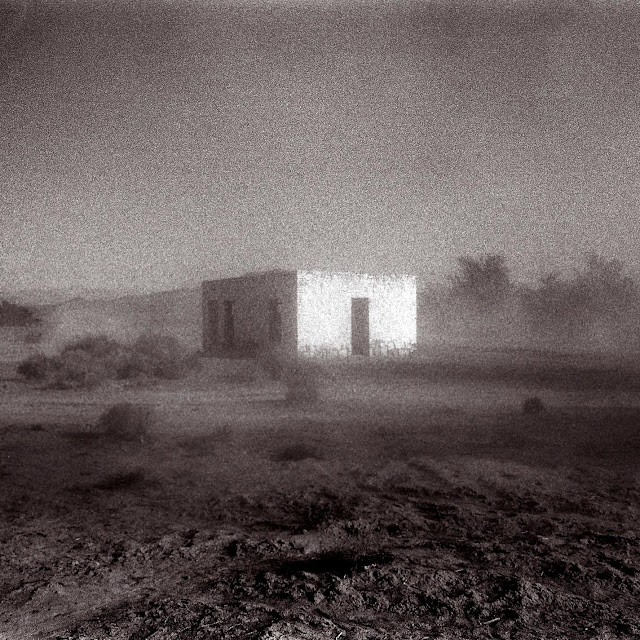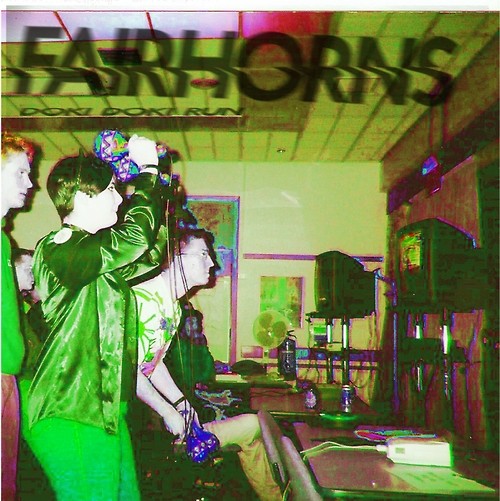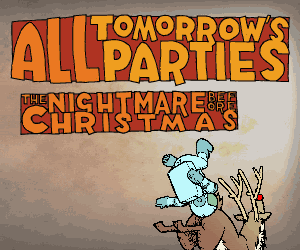
It by no means pertains to the greyish mundanities of many a life, but lyrically much of this record concerns human relations, and the way in which we seem to concentratedly wreck most rapports beyond repair as we struggle – often simultaneously – to tarnish our own bodies. We tattoo the names of the fleetingly meaningful onto our pasty skins; we drink to the point of destruction; we contuse our most tender of internal organs with inessential traumas and cram our skulls with superfluity. I once read what I felt to be a fallacious characterisation of Khan as an 'avant-garde It-girl', although through the gaze of The Haunted Man it becomes acutely apparent that she shares these same disdainful outlooks on society and its gradual degradation. Here transmogrified in great ruminator, yes, she may divorce herself from the wanton ways of the human yet in reconvening with the thematically terrestrial, Khan finally makes a real connection.
Largely devoid of dramaturgy, The Haunted Man is really quite simple, and by all things immortal does it suit her down to her sandy toes, or horse's hooves, or whatever else it may be that she's purporting to tot about upon these days. Intended as an effort powered by the raw wilds of nature (and those of these great isles, to be a little more precise) there's a veritably homely feel to The Haunted Man and, having relocated to the bucolic surrounds of rural Sussex, it feels as though home was where the heart was always to be found. This record is now as integral to her existence as the heart is to any sentient entity, palpitating ardently.
All that said and jotted down, beyond the emancipatory cover (you'll doubtless have read enough of Khan's concerted desexualisation of the female body; of the gender role reversion it portrays; of its revelatory illustration of the real woman beyond the glitter, Fur and Gold for it to be worth me scrutinising further) flashes of cosmic iridescence remain. The flatulent synths of opener Lilies, on which she vivaciously warbles of how thankful she is to live and breathe, shimmer with an unshakable ethereality, whilst Marilyn features commanding space cadet Beck Hansen. Yet that I recall reading of her envisaging her grandfather being able to witness her disrobed frame in Tesco of all places flings all this stuff out into the great, wide beyond to be replaced with a leaden reality to bring it all back down to earth. The former is Bat for Lashes by prettily opaque numbers, although the latter somehow harnesses the contrived desperation of celebrity culture. "Hold you, I'm touching a star/ Turn it into Marilyn, waiting out every big car" she soothes, her voice ascending ever heavenward. You sense she's not grand designs to transform into inexplicably attractive label magnate, but instead to condemn the flicker of fame. Marilyn may be a scintillating starlet one moment, yet as with uncountable helpless hopefuls before her she's destined to dwindle, and to do so most drastically. Musically, it's as accomplished as anticipated, and sounds more like something from Hurry Up, We're Dreaming than it does from Hansen's vivid sonic palette but the deranged yoo-hoos somewhere around the three minute-mark elevate its lustrous slow-burn up into the realms of the alluringly deranged anyway.
As with Prescilla and Sarah previously, Khan's penchant for feminine given names continues to serve her well and with time I've grown to like, if not quite love Laura. It's my favourite Laura in all of Laurasia, at any rate: a surging ballad that borders on the folkloric – a grand Celtic chord progression precipitating a slowly mounted crescendo – it's "glitter in the dark" type stuff for sure, although it lulls along at a suspiciously torpid pace. Alike to much of Born To Die, almost. Which ought come as little surprise, given that it was co-written by none other than Justin Parker – the man behind the omnipresently reportedly wounded façade of Video Games. It's an intriguing move from a woman here resolved to exhibit the real her, as it inextricably intertwines the fortunes of Bat for Lashes and Lana Del Rey. Both are but nom de plumes behind which their respective actors may toil – and toil admirably unremittingly, they both have – yet the latter has come to signify the superficiality of the contemporary in the most inconceivable manner imaginable. It's highly paradoxical, and with it quite ironic therefore, that in attempting to distance herself from the increasingly despicable Florence Welch she has drifted closer towards a yet more synthetic pop star construct. Del Rey may be the lesser of the two evils, but as far as verified artistry is concerned she's true base. Her body has been exploited by both those about her and she herself; her photos have been touched up in every respect, and so that she and Khan may be contrasted in any way seems greatly contradictory. Lana may be "more than a superstar" but, as with Marilyn, she is certainly one without any guaranteed longevity.
But The Haunted Man is otherwise incomparable with Born To Die, whether that be The Paradise Edition or otherwise. A Wall may be flimsy electropop balladeering finer than sherbet to leave an appositely over-saccharine aftertaste, but the palette is thankfully cleansed by the rather more effective Rest Your Head which follows it. The Kate Bush comparison to have long since shadowed her every work may come full circle as Khan yodels of "runnin' up hills and runnin' too slow", although such referencing is more than entirely acceptable given the astonishingly motivational weight behind it and the elate chorus with which it peaks. Horses Of The Sun plays off a rather more rudimentary thud 'n' strum pattern at once redolent of Charlotte Gainsbourg's Stage Whisper, whilst Oh Yeah sounds like the revelatory, first pagan celebrations of a cult founded on the slopes of Glastonbury's furthermost, grassiest expanse. Elsewhere, All Your Gold is arguably Khan's most effulgent recording to date, and that despite its saddening subject matter. It's consummate: its verse undecorated and with it primitive, its chorus is buffeted by clunky rhythms, an impeccable falsetto, and electronics softer than air. And with music here attaining a sense of the mystical, her lyrics revert to the tangible traumas of reality; to love unrequited. Trapped in a loveless relationship with "a good man" yet not the right man, his every sweet nothing is met with another of her goodbyes. It's relatable, despite its gleaming pop veneer being one that's tricky to cling to, and faithfully tells of the difficulties in letting somebody go for good. It is emotion and exacting articulation operating together in perfect harmony to the tune of a great modern-day lament.
Thus in unpacking the dressing-up box and dumping it with Pearl in the midst of nonexistence, Khan has made ample room for true emotion, and with that room into which she may mature. She has at long last lopped off the final syllable from her once defining adjective, fantastical, to assume her rightful place as one of our most precocious younger lyricists.
























